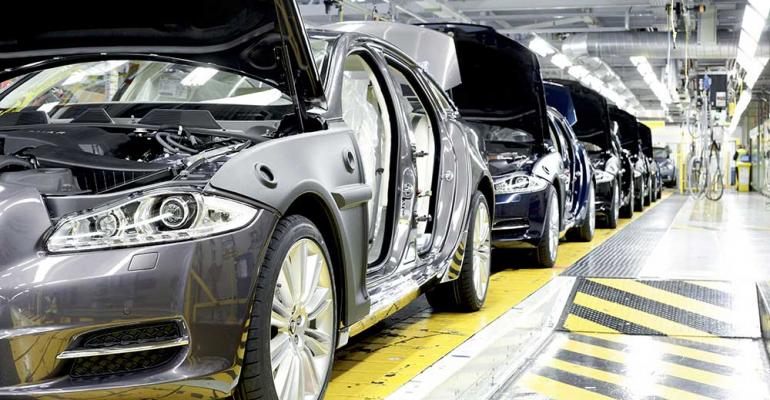U.K. vehicle manufacturers generated export earnings of more than £47,000 ($78,916) a minute last year, as car export values doubled from £12 billion ($20.1 billion) in 2004 to £24.8 billion ($41.6 billion) in 2013.
Releasing the data at its automotive industry summit in London, the Society of Motor Manufacturers and Traders says the growth was driven by diversification of U.K. car manufacturing and increasing global demand.
SMMT CEO Mike Hawes says alongside rising manufacturing volumes, the income surge largely is attributable to the shift toward building higher-quality models across the country, doubling the average export wholesale value of a car from £10,200 ($17,126) to £20,640 ($34,621).
“Countries around the world are spending twice what they were 10 years ago on U.K.-built cars,” Hawes says in a statement. “This reflects the thriving nature of our domestic industry and our global reputation for engineering expertise.”
Hawes says the U.K. industry is enjoying healthy demand from both growing and established markets.
“We want this success to continue, but urgently need more young people to join our industry, working in every area from design and engineering to manufacturing and retail,” he says.
U.K. car manufacturers built more than 1.5 million vehicles last year and are on course to break all-time records by passing the 2 million mark by 2017. About 80% of the vehicles are exported, half of them destined for the rest of the European Union.
Hawes says exports to wider global markets have increased markedly over the past decade, helped by growing worldwide demand for premium vehicles and the significant investments committed to the U.K. by global manufacturers.
The country has been quick to react to global car-buying trends, he says, and the booming demand for premium vehicles worldwide has led to a shift in the manufacturing landscape.
In volume terms, 28.9% of the U.K.’s exports were made up of premium and specialist brands in 2004. Now the share is 42.4%.
The SMMT says this pattern also is evident in the number of models built for each category, with premium vehicles moving from the minority in 2004 to account for almost 60% of the U.K. model count last year.
Jaguar, Land Rover in Golden Age, Exec Says
In his automotive summit keynote speech, Jaguar Land Rover Purchasing Director Ian Harnett says the British motor industry can rightfully celebrate a lot of good news at the moment.
“Strong car sales, high consumer confidence (and) a growing U.K. motor manufacturing sector,” he says.
“We (Jaguar Land Rover) now are selling more vehicles to more customers, while continuing to invest in our growth plans,” an SMMT transcript shows him saying.
“Jaguar and Land Rover are both longstanding car makers, with proud and distinguished histories. But truly these two great British brands have never been so successful. Their golden age is now. We will invest in 50 new product actions over the next five years.”
Harnett says JLR has reinvigorated its brands.
“The rewards are clear, 85% of our revenue now comes from exports, and that’s growing,” he says. “We now are behaving like a truly global car maker, not just a British car maker.”
JLR now assembles Jaguar XFs and Land Rover Freelanders in Pune, India, and soon will make vehicles in Changshu in China. It also has announced plans to build cars in Brazil.
“We are forging new relationships globally, to grow our business,” Harnett says.
In the U.K., JLR uses British-based suppliers where possible, and while about 50% of its components purchases come from the U.K., Harnett says the automaker wants to see this increase.
“It’s more environmentally friendly to source locally – carbon footprint is always worse when you have to transport parts over a long distance,” he says.
“I don’t believe we can truly claim to be a successful car manufacturing nation until we can source a large selection of components from the U.K. And, just as important, many of those components manufactured here should also be designed and developed here.”
A strong supply chain is crucial to a successful manufacturing nation, Harnett says. “(But) we’re not there yet.
“There really are some daft (crazy) anomalies with U.K. manufacturing and suppliers,” he says. “Britain now is a major manufacturer of engines – for BMW, Mini, Ford, Nissan and Toyota, among other makers. We make many more engines in this country than we do cars.
“Yet we have to import blocks, heads, most cranks, and all fuel injection units – there are simply no U.K.-based suppliers. They all come from abroad.”
Harnett says as JLR expands it has to go abroad for more plastic injection moldings because there is no more capacity left in the U.K.
“We as a country are in desperate need for more capacity in castings and large stampings,” he says. “These may sound unsexy compared with, say, lithium-ion battery capacity, but they are actually just as important in creating jobs, and there is a demand and need for such basic components.”
Harnett says the U.K. needs to do much better in attracting quality global auto suppliers.
“We need a strong active ‛U.K. plc’ to court major component suppliers from around the world,” he says. “We need a competitive environment for investment. We want U.K. suppliers to have access to finance to enable them to invest and grow.
“We need our government to provide more attractive incentives for new overseas suppliers to invest in the U.K. – simple, easy-to-access incentives.”
Still, Harnett says the future, for both the British motor industry, and for Jaguar Land Rover, is bright.
“We have much to be confident about,” he says. “There is much to be proud of. But there is much work still to do. There is no finishing line to business success. The challenges never get any easier.”





